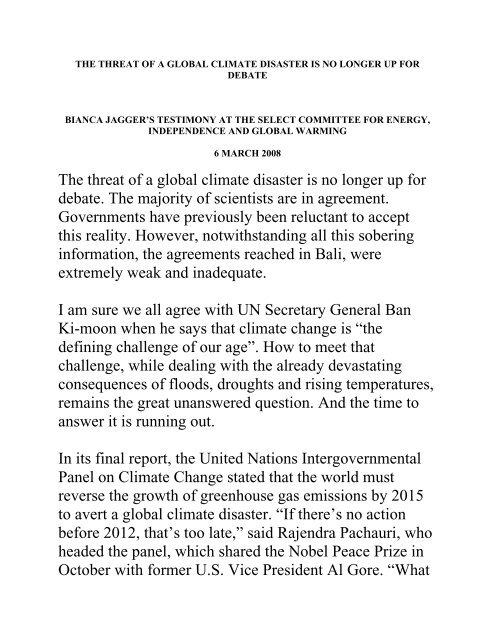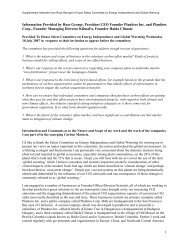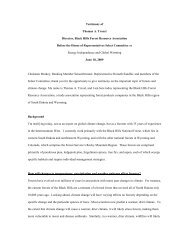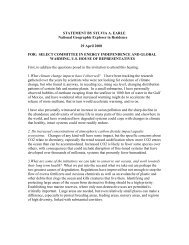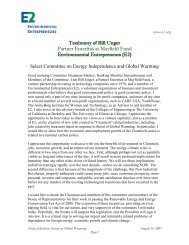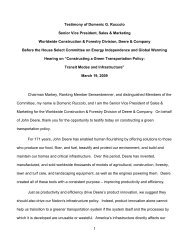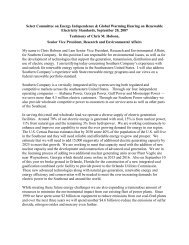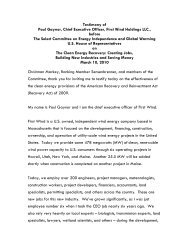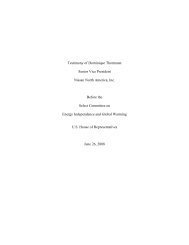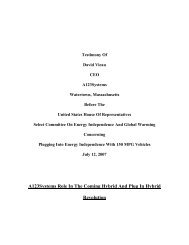Bianca Jagger - The Select Committee for Energy Independence ...
Bianca Jagger - The Select Committee for Energy Independence ...
Bianca Jagger - The Select Committee for Energy Independence ...
You also want an ePaper? Increase the reach of your titles
YUMPU automatically turns print PDFs into web optimized ePapers that Google loves.
THE THREAT OF A GLOBAL CLIMATE DISASTER IS NO LONGER UP FOR<br />
DEBATE<br />
BIANCA JAGGER’S TESTIMONY AT THE SELECT COMMITTEE FOR ENERGY,<br />
INDEPENDENCE AND GLOBAL WARMING<br />
6 MARCH 2008<br />
<strong>The</strong> threat of a global climate disaster is no longer up <strong>for</strong><br />
debate. <strong>The</strong> majority of scientists are in agreement.<br />
Governments have previously been reluctant to accept<br />
this reality. However, notwithstanding all this sobering<br />
in<strong>for</strong>mation, the agreements reached in Bali, were<br />
extremely weak and inadequate.<br />
I am sure we all agree with UN Secretary General Ban<br />
Ki-moon when he says that climate change is “the<br />
defining challenge of our age”. How to meet that<br />
challenge, while dealing with the already devastating<br />
consequences of floods, droughts and rising temperatures,<br />
remains the great unanswered question. And the time to<br />
answer it is running out.<br />
In its final report, the United Nations Intergovernmental<br />
Panel on Climate Change stated that the world must<br />
reverse the growth of greenhouse gas emissions by 2015<br />
to avert a global climate disaster. “If there’s no action<br />
be<strong>for</strong>e 2012, that’s too late,” said Rajendra Pachauri, who<br />
headed the panel, which shared the Nobel Peace Prize in<br />
October with <strong>for</strong>mer U.S. Vice President Al Gore. “What
we do in the next two to three years will determine our<br />
future.”<br />
But what should we do? I used to believe that reduced<br />
energy consumption was an important first step,<br />
accompanied by research and investment into energy<br />
efficiency and renewable energy sources. I used to believe<br />
that it would be enough to encourage more localized<br />
lifestyles, reducing the need <strong>for</strong> overburdened, polluting<br />
transport networks.<br />
But after reading the most recent scientific findings, I<br />
have come to realise that, even if we began each of these<br />
practises in earnest tomorrow, it is simply not enough.<br />
<strong>The</strong> time has come to expose the myth that we can avert<br />
climate catastrophe by small measures and “sticky<br />
plasters measures.” In the recent assessment by the highly<br />
respected climate scientist, James Hansen of the NASA<br />
Goddard Institute <strong>for</strong> Space Studies he suggested that the<br />
IPCC report, itself alarming reading, might even be<br />
“absurdly optimistic.”<br />
For example, the often-touted “safe” figure of 2°C (3.6°<br />
F) increase in average global temperatures is in fact not<br />
safe at all. We have already experienced a rise of 0.73°C<br />
in average global temperature: a rise of 2°C is three times<br />
that. Agreeing to a 2°C target does not avoid the
possibility of catastrophe. On top of this, the apparently<br />
bold target of reducing emissions by 50% does not<br />
guarantee that the temperature increase will be limited to<br />
2°C.<br />
Hansen estimates sea level rises of 4 to 5 metres this<br />
century due to melting ice in Greenland and Antarctica.<br />
He describes how the IPCC’s report fails to take<br />
geological records into account and ignores the so-called<br />
“albedo flip” property of water:<br />
“<strong>The</strong> ‘albedo flip’ property of ice/water provides a<br />
powerful trigger mechanism … A climate <strong>for</strong>cing that<br />
‘flips’ the albedo of a sufficient portion of an ice sheet<br />
can spark a cataclysm.”<br />
Hansen is telling us that the poles do not melt in a linear<br />
fashion, but rather in bursts – and that if the globe warms<br />
up just a few degrees, it might be enough to trigger a<br />
catastrophic ice sheet collapse. Such a collapse would not<br />
only drown most of the world’s centres of population, but<br />
would itself fuel further climate change, since less ice<br />
means less heat reflected back into space.<br />
“<strong>The</strong> Earth’s climate is remarkably sensitive to global<br />
<strong>for</strong>cings. Positive and ‘amplifying’ feedbacks<br />
predominate. This allows the entire planet to be<br />
whipsawed between climate states. Recent greenhouse
gas emissions place the Earth perilously close to dramatic<br />
climate change that could run out of control.”<br />
George Monbiot writer and columnist <strong>for</strong> the Guardian<br />
notes that, “If Hansen is correct, to avert the meltdown<br />
that brings the Holocene to an end we require … a sort of<br />
political “albedo flip”. David Wasdell, Director of the<br />
Meridian programme, in a book he co-authored called<br />
“Planet Earth, We Have A Problem,” talks about the<br />
impending tipping point:<br />
“If we go beyond the point where human intervention can<br />
no longer stabilise the system, then we precipitate<br />
unstoppable runaway climate change. That will set in<br />
motion a major extinction event comparable to the five<br />
other extinction crises that the earth has previously<br />
experienced.”<br />
I find it deeply mystifying that the vast majority of the<br />
media are still not adequately expressing the scale of the<br />
danger we face. Professor John Holdren, President of the<br />
AAAS, said in August, “We have already passed the stage<br />
of dangerous climate change. <strong>The</strong> task now is to avoid<br />
catastrophic climate change.” And as George Monbiot, in<br />
an article he wrote <strong>for</strong> the Guardian in July, said:<br />
“Unaware of the causes of our good <strong>for</strong>tune, blissfully<br />
detached from their likely termination, we drift into<br />
catastrophe.”
This clearly demonstrates what the World Future Council,<br />
the organisation I chair, is advocating. If we are serious<br />
about averting climate change catastrophe, we must think<br />
in revolutionary terms, and trans<strong>for</strong>m our way of life,<br />
restoring rather than destroying life on earth. We must<br />
embark upon a global renewable energy revolution: if we<br />
are to achieve the necessary carbon reduction by 2020, we<br />
must replace our carbon-driven economy with a<br />
renewable energy economy.”<br />
<strong>The</strong>re is no time to debate half-measures any longer: the<br />
period in which they may have been effective has long<br />
since passed.<br />
We have experienced an industrial revolution. We have<br />
experienced a technological revolution. It will take a<br />
global renewable energy revolution, similar in scale and<br />
consequence to those two, to avert catastrophe. As<br />
Hermann Scheer, member of the German Bundestag and<br />
the World Future Council, said, “This cannot be achieved<br />
with the method of ‘talk globally – postpone nationally,’<br />
but only with the method of ‘think globally – act locally,<br />
regionally and nationally.<br />
<strong>The</strong> beginnings of this movement may already be<br />
underway. Some nations have begun to act, even finding<br />
great financial opportunities along the way. In Germany,
pushes toward energy efficiency and renewable energy<br />
sources are spurring the economy. By 2020, every<br />
building must meet high levels of energy efficiency. <strong>The</strong><br />
Feed-In Tariffs legislation, which guarantees a<br />
preferential price <strong>for</strong> energy produced by renewable<br />
energy installations, has helped to create 250,000 new<br />
jobs in Germany. For an annual growth of renewable<br />
energy installed capacity of 3,000 MW. Since 2000 it has<br />
reduced Germany’s C02 emissions by 100 million tonnes.<br />
It has dramatically accelerated the introduction of<br />
renewable energy in the <strong>for</strong>ty-six countries and regions<br />
have now introduced variants of this legislation. It has<br />
also created important breakthroughs that are making<br />
renewable energy increasingly cost-competitive with<br />
fossil-fuel energy.<br />
It would be crucially important <strong>for</strong> the United States –<br />
perhaps led by individual states – to adopt Feed-In Tariffs<br />
as a significant way by which to accelerate the<br />
introduction of renewable energy. <strong>The</strong> USA cannot<br />
continue to rely on powering its cities, its industries, its<br />
farms and its transport systems by energy resources <strong>for</strong><br />
which there is ever greater global competition and which<br />
are fast running out. President Bush’s emphasis on bioethanol<br />
and nuclear power is not the solution. Already one<br />
third of America’s maize crop is used <strong>for</strong> producing gas<br />
<strong>for</strong> American cars. This is pushing up food prices and<br />
threatening global food supplies. 200 times more surface
area is required to produce energy from crops as<br />
compared with energy from photovoltaic cells. It makes<br />
much more sense to produce energy <strong>for</strong> homes and even<br />
<strong>for</strong> urban transport from the roofs of buildings and from<br />
solar and wind installations on the edge of cities. This<br />
process has started across Europe and it is high time that<br />
the US took the lead, once again, in the renewable energy<br />
revolution.<br />
Meanwhile we have to face some ugly and unavoidable<br />
truths: despite the clear and urgent alarms sounded by<br />
thousands of respected scientists, the developed world<br />
continues to feed its out-of-control oil addiction. We are<br />
still locked into an inefficient, pollution-based economy,<br />
which is undermining public health and the environment,<br />
aggravating inequality and turning us into oil predators.<br />
<strong>The</strong> rich world is causing climate change and the poor<br />
world is suffering. As climate change kicks in, the<br />
tropical and subtropical countries of Africa, South Asia<br />
and Latin America will heat up even more, their climates<br />
becoming intolerable. Droughts will affect large parts of<br />
Africa, Asia and Latin America. Melting glaciers will<br />
flood river valleys. When the floods have subsided,<br />
unprecedented droughts will occur. A poor, low-lying<br />
country like Bangladesh will find it much harder to cope<br />
with sea level rise than a rich region like Florida. Ban Kimoon<br />
said: “Climate change will affect developing
countries the most. Those who are most vulnerable are<br />
also the most at risk from this threat. Melting glaciers will<br />
trigger mountain floods and lead to water shortages in<br />
South Asia and South America. Reduced rainfall will<br />
aggravate water and food insecurity in Africa.”<br />
If current trends are allowed to continue, hundreds of<br />
millions of people in poorer countries will lose their<br />
homes as well as the land on which they grow their crops.<br />
And then there is the threat of disease and epidemics:<br />
according to Christian Aid, by the end of the century, 182<br />
million people in sub-Saharan Africa alone could die of<br />
diseases and epidemics directly attributable to climate<br />
change.<br />
Other species will suffer, too. <strong>The</strong> IPCC report stated that<br />
if governments fail to act, melting ice sheets could lead to<br />
rising sea levels and the extinction of entire species of<br />
animals and plants.<br />
We must integrate the twin goals of climate care and<br />
development to avoid the race between growth and<br />
catastrophe. Global justice requires that we make personal<br />
and collective choices to use the Earth’s resources<br />
prudently. We are challenged to rebalance our lifestyles to<br />
ensure that future generations have adequate natural<br />
resources, a stable climate and a healthy planet.
From climate chaos to global justice – how can such a<br />
transition be achieved? As I see it, there are two key<br />
issues.<br />
First, the rich countries need to dramatically reduce their<br />
consumption of fossil fuels and to accelerate the<br />
development of renewable energy as the basis of a totally<br />
new energy system <strong>for</strong> the planet. Every year, we burn a<br />
million years’ worth of fossil fuel deposits. This makes<br />
the unprecedented standards of living <strong>for</strong> a large portion<br />
of people in rich countries possible. Meanwhile, rapid<br />
economic growth is also disproportionately increasing the<br />
living standards of minorities in developing countries. But<br />
all this is possible only because we are running down the<br />
earth’s assets – particularly its fossil fuel resources – at an<br />
unprecedented rate, damaging the atmosphere in the<br />
process.<br />
If the rich, industrialised countries want to limit average<br />
global temperatures, they will have to commit to zero<br />
carbon emissions, whilst working vigorously to restore<br />
the earth’s capacity to absorb greenhouse gases. <strong>The</strong><br />
previous suggestions by the EU of an 80% reduction in<br />
CO2 emissions by 2050 are woefully inadequate and<br />
some scientists regard it as irresponsible given the gravity<br />
of the current situation. In Bali, the rich countries have<br />
used all the timidity at their command to propose such<br />
inadequate target figures. We have already reached the
stage of dangerous climate change: the task now is to<br />
prevent catastrophic climate chaos.<br />
“Climate justice” means giving the poorer countries<br />
access to renewable energy technologies to help them<br />
with truly sustainable development. Only if we can show<br />
the plausibility and benefits of development without fossil<br />
fuels can we encourage third world countries to initiate<br />
their own emissions reductions.<br />
Second, governments need to make every ef<strong>for</strong>t to protect<br />
the world’s ecosystems, like <strong>for</strong>ests and coral reefs.<br />
Large-scale projects to re<strong>for</strong>est denuded areas of land are<br />
also needed, above all else <strong>for</strong> the benefit of local<br />
populations. We must begin to pay developing countries<br />
<strong>for</strong> the global “ecosystem services” provided by their<br />
<strong>for</strong>est cover – and their capacity to absorb carbon dioxide<br />
and to release moisture to distant places.<br />
Affirming the principle of “ecological debt,” we need to<br />
acknowledge that victims of climate change are entitled to<br />
have their ecosystems restored, to have the loss of land<br />
and livelihood they have suffered properly addressed –<br />
and to establish legal precedents to that effect.<br />
Above all, we must seize this moment of public<br />
awareness to <strong>for</strong>ce politicians to do the right thing. We<br />
should be clear: politicians will not make the right choices
with respect to climate and development unless they are<br />
<strong>for</strong>ced by public pressure to do so.<br />
It is my hope and the hope of millions of people in this<br />
country and throughout the world that the next President<br />
of the United Stated will embark on a Renewable <strong>Energy</strong><br />
Revolution. <strong>The</strong> United State needs a new kind of leader;<br />
a leader who will not shy away from making hard<br />
choices. It is often said that voters are green in principle,<br />
but cynical in practice. It will take a strategy of action and<br />
tremendous public education and motivation to change<br />
this. But if we are committed to saving the world from<br />
climate change catastrophe, we must act now.<br />
<strong>The</strong> World Future Council, as the voice of future<br />
generations, is drawing special attention to the importance<br />
of renewable energy as the basis of a totally new energy<br />
system <strong>for</strong> the planet. We need to initiate appropriate<br />
policy in this country and worldwide to install carbonfree,<br />
decentralized, efficient, renewable and secure energy<br />
systems sufficient <strong>for</strong> all the earth’s people. This switch<br />
needs to start immediately. <strong>The</strong> World Future Council<br />
perceives it as a crime against the future if the gap<br />
between ‘knowing’ and ‘acting’ in all the related areas of<br />
climate change is not overcome immediately.<br />
It is the responsibility of leaders everywhere to fully<br />
understand this problem if they are to meet the challenges
e<strong>for</strong>e us. Failure to act effectively is likely to precipitate<br />
cataclysmic changes in the earth system that could<br />
obliterate life on earth.


